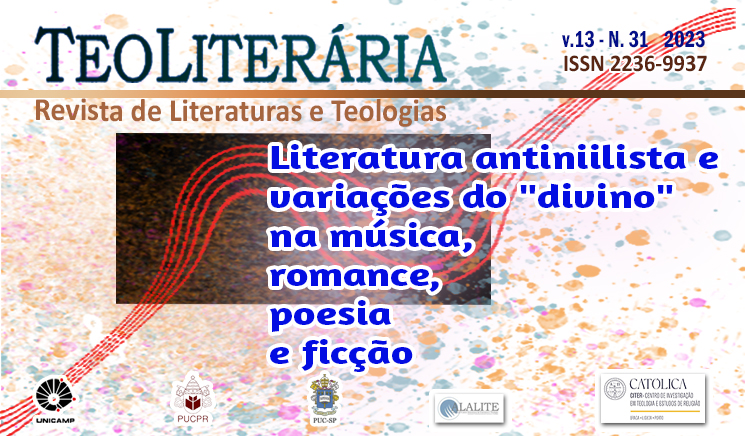The Land of Fairies of J. R. R. Tolkien
Faërie as the “middle earth” between the realm of senses and the realm of Ideas
DOI:
https://doi.org/10.23925/2236-9937.2023v31p210-232Keywords:
Faërie, phantasy, imagination, language, realityAbstract
This article investigates J.R.R. Tolkien's essay "On Fairy-Stories" with the aim of outlining a hermeneutics for the metaphor of "Faërie," the Elfland, always in dialogue with the philosophical tradition of ancient Greece, specifically with Plato's "Republic" and Aristotle's "De Anima" and "Poetics."; and Aquina’s “Suma Theologica”. The historical context of early 20th-century England and J.R.R. Tolkien's biography endorse this author's belonging to a Catholic religious and philosophical tradition that reclaimed so-called realistic philosophy as the foundation for understanding the world. From this theoretical-methodological approach, we find a dual significance for Faërie, firstly, in a more Platonic inspiration, as the intermediary reality between the sensible dimension perceived by human senses and the intelligible dimension consisting of the ideas that inform material things. In a second interpretation, with a more Aristotelian hue, the metaphor of the Elfland can be understood as the matrix of combinatory possibilities through the language of forms originating from the perception of reality by the human mind, with Faërie being constituted by imagination or fantasy, the capacity of humans to form images from memory, which serves as the basis for the abstraction of universal forms.
References
ARISTÓTELES. De Anima. Tradução e notas de Maria Cecília Gomes dos Reis. São Paulo: Editora 34, 2006.
ARISTÓTELES. Poética. Tradução e notas de Eudoro de Sousa. Lisboa: Imprensa Nacional /Casa da Moeda, 1994.
BERTI, Enrico. No Princípio era a Maravilha: As grandes questões da filosofia antiga. Tradução de Fernando Soares Moreira. São Paulo: Edições Loyola, 2010.
BIRZER, Bradley J. J. R. R. Tolkien’s Sanctifying Myth: Understanding Middle-earth. Wilmington, DE: ISI Books, 2002.
BRAGUE, Rémi. Âncoras no Céu: a infraestrutura metafísica. Tradução de Nicolás Campanário. São Paulo: Edições Loyola, 2013.
CARPENTER, Humphrey. J. R. R. Tolkien: uma biografia. Tradução de Ronald Kyrmse. Rio de Janeiro: HarperCollins, 2018.
FAITAIN, Paulo. A ordem dos anjos, segundo Tomás de Aquino. Ágora filosófica, ano 10, n. 1, jan-jun, 2010: 23-42
FLIEGER, Verlyn; ANDERSON, Douglas A. Tolkien On Fairy-stories. Expanded edition, with commentary and notes. London: HarperCollins, 2014.
HAMMOND, Wayne G.; SCULL, Christina. The J. R. R. Tolkien companion and guide: Chronology. Londres: HarperCollins, 2006.
KLAUTAU, Diego. Metafísica da Subcriação: A Filosofia do Mito em J. R. R. Tolkien. São Paulo: A Outra Via, 2021.
MCINTOSH, Jonathan S. Tolkien, St. Thomas, and the Metaphysics of Faërie. Kettering, OH: Angelico Press, 2017.
PLATÃO, A República. Tradução e notas de Maria Helena da Rocha Pereira. Lisboa: Fundação Calouste Gulbenkian, 2017.
REALE, Giovanni. O saber dos antigos: terapia para os tempos atuais. Tradução de Silvia Cobucci Leite. São Paulo: Edições Loyola, 2014.
SHIPPEY, Tom. The Road to Middle-Earth. London: HarperCollins Publishers, 1992.
TESTI, Claudio A. Pagan Saints in Middle-earth. Zurich and Jena: Walking Tree Publishers, 2018.
TOLKIEN, J. R. R. Árvore e Folha. Tradução de Reinaldo José Lopes. Rio de Janeiro: HarperCollins Brasil, 2020.
TOLKIEN, J. R. R. Beowulf: Uma tradução comentada. Edição de Christopher Tolkien e tradução de Ronald Kyrmse. Editora WMF Martins Fontes, 2015.
TOLKIEN, J.R.R. On Fairy-Stories. In: FLIEGER, Verlyn; ANDERSON, Douglas A. Tolkien On Fairy-stories. Expanded edition, with commentary and notes. London: HarperCollins, 2014
TOMÁS DE AQUINO. Suma Teológica. Tradução de Carlos-Josaphat Pinto de Oliveira, OP. (coord.). São Paulo: Edições Loyola, 2001
Published
How to Cite
Issue
Section
License
Copyright (c) 2023 TEOLITERARIA - Revista de Literaturas e Teologias

This work is licensed under a Creative Commons Attribution 4.0 International License.
TeoLiteraria – Journal of Literatures and Theologies owns the copyright of all published material. The whole reproduction of the articles of this Journal in other publications or for any other purpose, by any means, requires a written permission of the editor of this journal. Partial reproductions of articles (abstracts, more than 500 words text, tables, figures and other illustrations) must have a permission written by the publisher and the authors.

